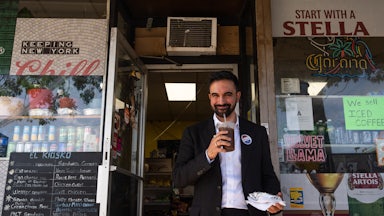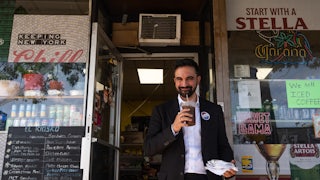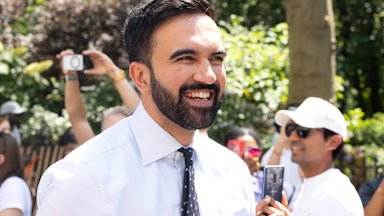This week, Andrew Cuomo decided to officially mount an independent bid for mayor of New York City. He made the announcement in a video on Monday that attempted to mimic the effortless charm and easygoing charisma of his opponent, the Democratic nominee, Zohran Mamdani. It didn’t work. Mamdani immediately ratioed the video by simply replying with a link to donate to his campaign. And no wonder the gimmick failed: It was like an off-brand rip-off of a favorite cereal you’d find at the grocery store. Cuomo’s announcement was the “Great Value” version of a Mamdani video. Instead of Cheerios, he was offering Cuom-Oats.
Cuomo’s pivot to video was merely the latest in a series of failed attempts to discredit Mamdani as somehow inauthentic or insincere. Ever since he jolted the political establishment with his inspirational and—once the votes were counted—overwhelming victory in the city’s mayoral primary last month, there’s been a relentless and often bigoted attempt by Republicans and some Democrats to cast him as somehow abnormal.
These efforts have spanned the spectrum of absurdity. The president called him a “communist” and threatened to deport him; Sen. Kirsten Gillibrand falsely accused him of supporting “global jihad” (for which she later apologized); former Minnesota Congressman and alleged presidential candidate Dean Phillips—whose face you wouldn’t remember if you were standing directly in front of him—said there is no room in the Democratic Party for a socialist like Mamdani; Christopher Rufo, a leading online weirdo and the right’s preeminent peddler of racist lies about immigrants eating household pets, accused Mamdani of strategically adopting “the symbols of the exotic other.”
Mamdani’s critics would have you believe that he is somehow unusual or out of step with the values and interests of ordinary people. But as someone who has spent more than ten years cataloguing the weird, unsettling, and sometimes inscrutable behaviors of politicians in my job as a late night comedy writer, I can say with near certainty that the opposite is true. The core of Mamdani’s appeal is that he is aggressively, perhaps even radically, normal.
For at least a decade now, Americans have been inundated with radioactive levels of weirdness by a political class with strange obsessions: Hannibal Lecter, the sexiness of cartoon M&Ms, testicle tanning, “woke math.” Let’s consider, for a moment, the man who is, from a strictly statistical perspective, the most prolific practitioner of weirdness on the face of the planet: Donald Trump. The ways in which he is off-putting are simply too numerous to count. Our best scientists have tried and been driven mad by the task. It’s like staring directly into the sun or crossing the event horizon of a black hole.
His tendency to caress American flags on stage and in front of cameras is, on its own, the sort of thing you might do if you were accidentally exposed to an unusually high dose of nitrous oxide. To this day it remains a mystery what exactly he means when he says Finland—a “forest nation,” he’s been told—rakes the “floors of the forest.” Or what sentiment he was hoping to convey when he described a hurricane as “one of the wettest we’ve ever seen from the standpoint of water,” a linguistic puzzle that remains unsolved to this day. Or why he thought it was important to let us know that Arnold Palmer has an unusually large penis. (Trump was only relaying this observation secondhand. We’re still awaiting definitive proof.)
And while it’s true that Republicans have outpaced their opponents in this department, Democrats have engaged in their share of weirdness too. During the 2024 Super Bowl, a raspy Joe Biden made a TikTok video where he professed his love for chocolate chip cookies in a way that can only be described as “minimally alive.” Sen. John Fetterman (who recently complained about having to show up to work) dresses like he was dropped naked into a Carhartt store and given five minutes to pick an outfit. House Democrats filmed a cursed “Choose Your Fighter” video where they gently bounced up and down like video game characters and made everyone sad (the video is now illegal in several states and if you watch it, you will have seven days before you die). Mainstream Democrats have resorted to gimmicks rather than authenticity to grab attention.
Then came Mamdani, with his relentlessly normal way of talking and his laser focus on normal things that matter to normal people. His campaign was a refreshing break from the exhausting strangeness of our current era, one that imagined that sane conversations about public policy were still possible. His seismic win has provided many lessons for Democrats hoping to replicate his success across the country. But one of those lessons should be this: Just be normal.
Mamdani has his own standout qualities and electoral advantages, and it may not be possible for other Democrats to replicate them all. He’s a wildly talented politician and a gifted public speaker. He’s telegenic and charismatic. He’s one of the few politicians who, somehow, does not seem out of place in TikTok videos with comedians. He deftly managed a sprawling campaign apparatus that reached across a city of eight million people. His canvassing and phone banking operations were so impressive that he even outperformed expectations on Staten Island, of all places (a borough consisting entirely of uncles who work in sanitation, if my own family experience is any guide).
But Mamdani’s disarming normality is one trait that Democrats could cultivate. One of his first viral videos was about bringing down the price of Halal food trucks. He made a video about losing his race for student body vice president in high school. He told The Bulwark he met his wife on Hinge. Even his brief attempt at a career in music—as a rapper named Mr. Cardamom—is charming and relatable. Millennials who came of age in the early YouTube era know what it’s like to have evidence of our failed creative pursuits online (I’m sure there’s a video somewhere of me doing improv comedy in the basement of a Gristedes circa 2013 that would sink me if I ran for public office).
This aggressively charming normalcy is especially refreshing after four years of Eric Adams, a mayor who radiates nuclear levels of weirdness. No public figure outside of Trump has ever uttered so many inscrutable, madness-inducing phrases. Like his infamous “table of success,” or his obsession with “swagger,” or the time he said New York was a place where “you could experience everything from a plane crashing into our Trade Center through a person who’s celebrating a new business that’s open.” If we gave him another four years, it’s entirely possible that he could scale new heights of linguistic weirdness and say something like, “Success is my DJ when I’m on the dance floor of wisdom, New York is the home of pizza and 9/11.”
Andrew Cuomo suffered from similarly toxic levels of Politician Brain, which is why his campaign was so relentlessly abnormal. He barely appeared in public, described the city he wanted to govern as a crime-ridden hellhole out of a steampunk novel, drove to his polling place (which was only a few blocks away) and couldn’t convince anyone that he actually lived here. His Super PACs spent ungodly sums on racist ads. He collected lukewarm endorsements from an impotent and lethargic Democratic establishment. He didn’t have supporters so much as he had underwriters (at least one of whom told The New York Times he didn’t even rank Cuomo first).
This was all documented by an incredible moment on NY1, when anchor Errol Louis asked a reporter at Cuomo’s election night party if the people in attendance looked “like they were out working today,” and the reporter replied earnestly, “No, these are the people who—their work was through writing checks for the Cuomo campaign.”
And just as important as the way Mamdani talks is what he talks about: buses, childcare, rent. Normal stuff that normal people care about. His appealing brand of democratic socialism—borrowing in part from Milwaukee’s so-called “sewer socialism”—was hyper-fixated on simple, straightforward, broadly popular ideas for making municipal government work better for regular people. He was singularly focused on the cost of living. When he talked about making the slowest buses in the country faster, he made a point of noting that long commutes were robbing New Yorkers not just of their “time,” but also their “sanity.” His campaign was focused relentlessly on making normal life for normal people more… normal.
This vision of politics recognizes that government can and should provide normalcy. You should be able to get to your job within a reasonable amount of time. You should have access to affordable groceries in your neighborhood. You should be able to afford an apartment and be able to send your kids to preschool. You should be able go about your day without secret police snatching you off the street or demanding to see your papers. You should not have to make tradeoffs between medicine and housing, childcare and food—especially in the richest city, in the richest country, on Earth. This is a set of policies organized more than anything else around the principle that life should, simply put, be livable.
Hysterical Republicans and their allies in capital now find themselves in the unenviable position of having to make these reasonable ideas sound scary. It’s a tough sell. A CNBC host claimed Mamdani was “taking Wall Streeters and making them walk out on the ice,” like Bane in The Dark Knight Rises. (If Bane had actually focused on hedge fund brokers and corporate CEOs, he might have had more support.)
Fox and Friends tried to terrify its viewers with ominous warnings about Mamdani’s plans for no-cost childcare and, most chilling of all, “baby baskets for newborns,” an idea that couldn’t sound any more charming if it also included free sunglasses for dogs. They even gave him a cool nickname, “Zohran The Destroyer,” that made him sound like the lead guitarist from an ‘80s hair metal band. Adams called Mamdani a “snake oil salesman,” although given Adams’ penchant for weird metaphors it’s possible he meant this as a compliment (“New York is a place where snakes can sell oil and rats can eat pizza, that’s what swagger is all about”).
Democrats will no doubt be tempted to draw the conclusion from Mamdani’s victory that all they have to do to replicate his success is “go viral.” Maybe Andrew Cuomo will eat spicy chicken wings or Chuck Schumer will make a “Get Ready With Me” video. But Mamdani’s deft use of social media is only a small part of the story. The bigger lesson is his unrelenting focus on confronting powerful interests in pursuit of a New York that works for everyone.
Social media gimmicks will continue to fail if they don’t begin with a bold and authentic set of ideas. In Mamdani’s case, a simple, straightforward policy program seeking to fix a broken system and make normal life more normal—and more affordable—for ordinary people. The last ten years of American politics have been a ceaseless barrage of deprivations, vindictiveness, cruelty and exhaustion. Everyone is overwhelmed; American civic life is overwhelming. People need relief. Mamdani promises a new chapter of humane, joyful normalcy. In other words, he’s sitting down at the table of success—and inviting everyone to join him.




